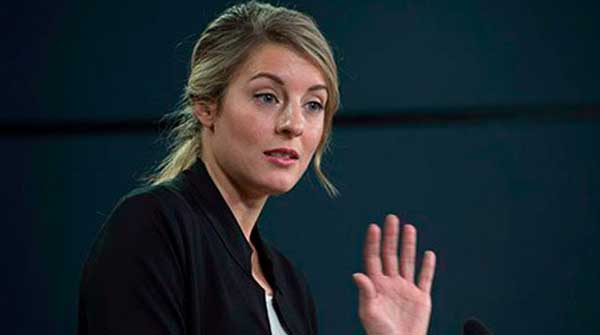Joly’s foreign policy approach will not protect Canada’s sovereignty
 Having once led the government’s foreign policy unit, I paid particular attention to Global Affairs Minister Melanie Joly’s October 30 speech on the topic in Toronto. Correctly diagnosing an increasingly dangerous world, she outlined a shift in foreign policy centred on two sound new principles: protecting our sovereignty and conducting pragmatic diplomacy.
Having once led the government’s foreign policy unit, I paid particular attention to Global Affairs Minister Melanie Joly’s October 30 speech on the topic in Toronto. Correctly diagnosing an increasingly dangerous world, she outlined a shift in foreign policy centred on two sound new principles: protecting our sovereignty and conducting pragmatic diplomacy.
Unfortunately, her emphasis on defending the corroded “rules-based global order” won’t actually advance those principles.
Greater self-reliance is the medicine Canada would actually need.
Protecting our sovereignty has to start with a sober assessment of our current level of commitment. Compared to the U.S. defence budget of nearly $900 billion, or 3.5 percent of GDP, Canada spends just under $37 billion, 1.3 percent of GDP. Despite pressures to do more, we get away with it because of our lucky geographic location. But dependency is a double-edged sword with benefits and risks.
 Melanie Joly (File) |
| More from Randolph Mank |
| What the world needs now is … détente
|
| Geopolitical catastrophes in the making
|
| Strategic procrastination is Canada’s preferred Indo-Pacific strategy
|
America’s $1.7 trillion federal budget deficit is adding to an increasingly unsustainable $33 trillion national debt. Interest payments alone are set to exceed defence spending soon. Assistance packages for Ukraine, Israel and Taiwan are adding up. Wars cost trillions more.
Canada has its own $43 billion federal budget deficit and $1.3 trillion debt. But if the U.S. security umbrella were to diminish under the weight of financial strain, we would be forced to spend much more to defend our massive geographical space, extensive coastlines, widely dispersed population, and critical infrastructure.
The promised Canadian defence policy update will fall short if it doesn’t address this dependency risk.
Taking greater responsibility for ourselves would mean prioritizing domestic and continental defence. Our current naval and air assets cannot adequately protect our homeland. Planned procurements will help if we can overcome delays. New surface vessels will be useful for coastal patrol, ice-breaking, and rescue. But they’ll likely be sitting ducks in any future warfare.
Likewise, our $39 billion commitment to upgrade NORAD over two decades, though helpful, will be insufficient. It focuses primarily on improving sensors, strengthening command and control, and buying air-to-air missiles for yet-to-be-acquired F-35 stealth fighter jets, costing another $19 billion.
Protecting our sovereignty will require getting over our allergy to missile defence. It would mean a NORAD-Plus initiative to build up “iron dome” anti-missile and cyber defence systems to defend our vulnerable cities, ports, power grids, communications and other critical infrastructure.
For deterrence, we would need to muscle up with fleets of long- and short-range missiles and drones situated on all three coasts, combined with satellite guidance systems and advanced cyber and robotic capabilities. As for Arctic sovereignty, the Northwest Passage is viewed as international waters by the U.S. and others. Though we disagree, co-operation will be the only option if it becomes a viable global shipping route.
Joly’s second principle, taking a pragmatic approach to foreign policy, would mean focusing more on core national interests than on trying to change the world. Our primary interest by far is, and always will be, managing the relationship with the U.S., including border security. But we should strive to increase global exports of, and investments in, such key assets as energy, minerals, agrifood, building products, and so on.
Accelerating LNG exports to Asia, for example, would directly benefit us. Reducing red tape, including our overuse of trade sanctions, would, too. Though alliance solidarity is sacrosanct, our interests are actually better served, not by striking heroic ‘me-too’ military poses, but by avoiding foreign entanglements, as we did in Iraq. Training is an appropriate level of commitment. But being prepared to offer dispute mediation assistance before considering military participation would help, too.
Regarding development assistance, pragmatism would mean reassessing bilateral projects and directing more of our nearly $7 billion annual foreign aid to such essentials as food aid, emergency relief and peace support. A pragmatic approach to immigration might mean pausing new applications, except for students, refugees and temporary workers, until we can clear the current backlog, improve our processes, and allow the housing sector to catch up – none of which will be achieved by the government’s October 31 plan, “An Immigration System for Canada’s Future” and the rush to reach 500,000 newcomers annually.
In sum, protecting our sovereignty and pursuing pragmatic foreign policy are sound principles. But trying to rescue the rules-based global order, rather than changing ourselves, is status quo for Canada. It took 9/11 to shock us into action over border security. Let’s hope it doesn’t take an attack on our soil to make us see the necessity of greater self-reliance.
Randolph Mank is a former Canadian diplomat and business executive. He currently heads MankGlobal consulting, serves on boards, and is a Fellow of the Canadian Global Affairs Institute, Triple Helix, and the Balsillie School of International Affairs.
For interview requests, click here.
The opinions expressed by our columnists and contributors are theirs alone and do not inherently or expressly reflect the views of our publication.
© Troy Media
Troy Media is an editorial content provider to media outlets and its own hosted community news outlets across Canada.
